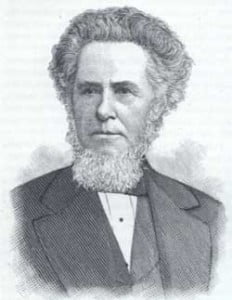A Young Pastor Caught in the Middle
 The Old School/New School division of the Presbyterian Church, U.S.A. officially took place in 1837. But the controversy had been roiling along for many years prior, and by the time that Tenth Presbyterian Church in Philadelphia was organized, in 1829, the controversy was really coming to the fore. The first pastor of the church was Thomas A. McAuley, a New School man who managed to steer the new church into the only New School Presbytery within the Synod of Philadelphia, all to the dismay of the Rev. Ashbel Green and the other Old School men in Philadelphia, who had such hopes for the new church.
The Old School/New School division of the Presbyterian Church, U.S.A. officially took place in 1837. But the controversy had been roiling along for many years prior, and by the time that Tenth Presbyterian Church in Philadelphia was organized, in 1829, the controversy was really coming to the fore. The first pastor of the church was Thomas A. McAuley, a New School man who managed to steer the new church into the only New School Presbytery within the Synod of Philadelphia, all to the dismay of the Rev. Ashbel Green and the other Old School men in Philadelphia, who had such hopes for the new church.
But Rev. McAuley only stayed for four years before leaving for greener fields (he went on to found Union Theological Seminary in New York). And in God’s providence, Henry Augustus Boardman was graduating from Princeton right about that same time. Boardman had been born in Troy, New York on January 9, 1808, graduated from Yale and then Princeton, but thought he would prefer being the pastor of a rural church. Instead, he was urged to supply the vacant pulpit at Tenth, and despite some misgivings on his part, finally accepted the call to serve there as pastor.
In a published history of Tenth Presbyterian Church, Allen Guelzo tells the story of the challenges that immediately confronted Boardman as he became the new pastor of the church :
—
Not that all the qualms in Boardman’s stomach were thereby stilled. There remained the unsettling business of Tenth’s attachment to the New School Second Presbytery. That business was made even more unsettling when on the eve of his ordination and installation the Synod of Philadelphia finally lost its patience with the New Schoolers and ordered the Second Presbytery dissolved. Since this drastic action could not be made final until the General Assembly met the following May, the New Schoolers held onto a brief stay of execution. But that left Boardman in the unhappy predicament of having to seek ordination at the hands of a presbytery that was virtually an outlaw organization; nor could he wait until the following May to see where the chips would fall, since his ordination and installation had been set for November 8, 1833.
Once again, he began to question whether he ought to join a presbytery under such suspicion and when he had such little sympathy with its tenets. “Unquestionably,” wrote Boardman, “it was a controversy which involved both the purity of our faith and the integrity of our ecclesiastical polity. Two incompatible systems of doctrine and two no less irreconcilable theories of ecclesiastical authority and policy” were at stake. In Boardman’s mind, there was no hope of compromise “between those who training had made them decided and earnest Presbyterians and others who had adopted our standards in a loose and general way.” Nor was it, he observed, “a mere war of words, It took hold upon the central truths of the Gospel, such as original sin, the atonement, regeneration and justification.”[1] Nevertheless, Boardman decided to go ahead with the ordination, a move that was to set a precedent for later pastors of Tenth Church who found themselves with similarly difficult choices. In time, his decision proved wise. Boardman was able to sever Tenth’s connections with the New School Presbytery, and in 1837 the General Assembly removed the thorn of New School Presbyterianism from Boardman’s side by moving to lop all New School Presbyteries off its rolls. Not until 1869 were Old School and New School Presbyterians reunited.
[1] Boardman, Henry A., Two Sermons Preached on the Twenty-fifth and Fortieth Anniversaries of the Author’s Pastorate. Philadelphia: Inquirer Book and Job Print, 1873, p. 31.
—
[Excerpted from Making God’s Word Plain: Tenth Presbyterian Church, 150 Years (1829-1979). Philadelphia, PA: Tenth Presbyterian Church, 1979, pp. 45-46.]
Words to Live By: Scripture does not promise an easy path in life for the Christian. If anything, we are promised conflict (2 Tim. 3:12). But we also have clear promises of God’s wisdom, as well as the charge to be at peace with all men, so far as we are able. (Rom. 12:18). Through diligent study of the Bible, godly counsel, and prayerful trust in God, we can find our way through life’s challenges.
Note: Our Through the Scriptures and Through the Standards sections have now been replaced by RSS feeds which appear at the top of right-hand column, and also at the bottom of each blog age.
